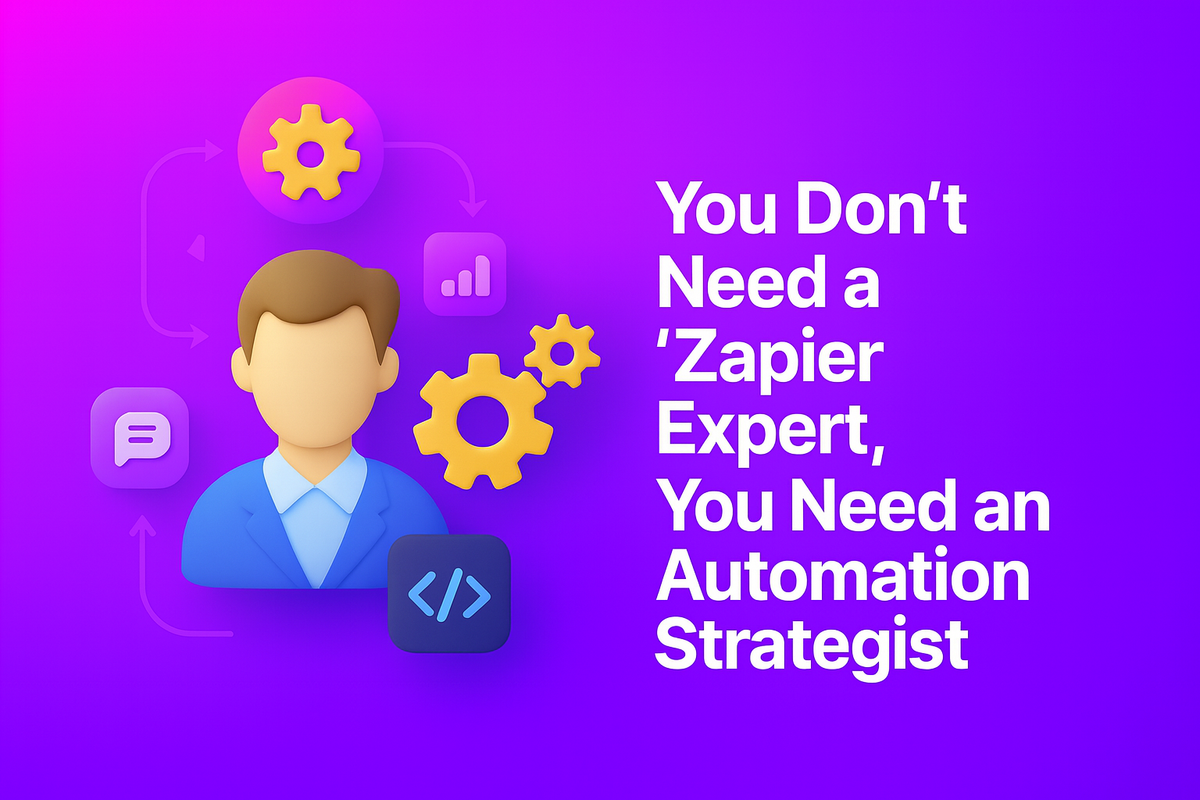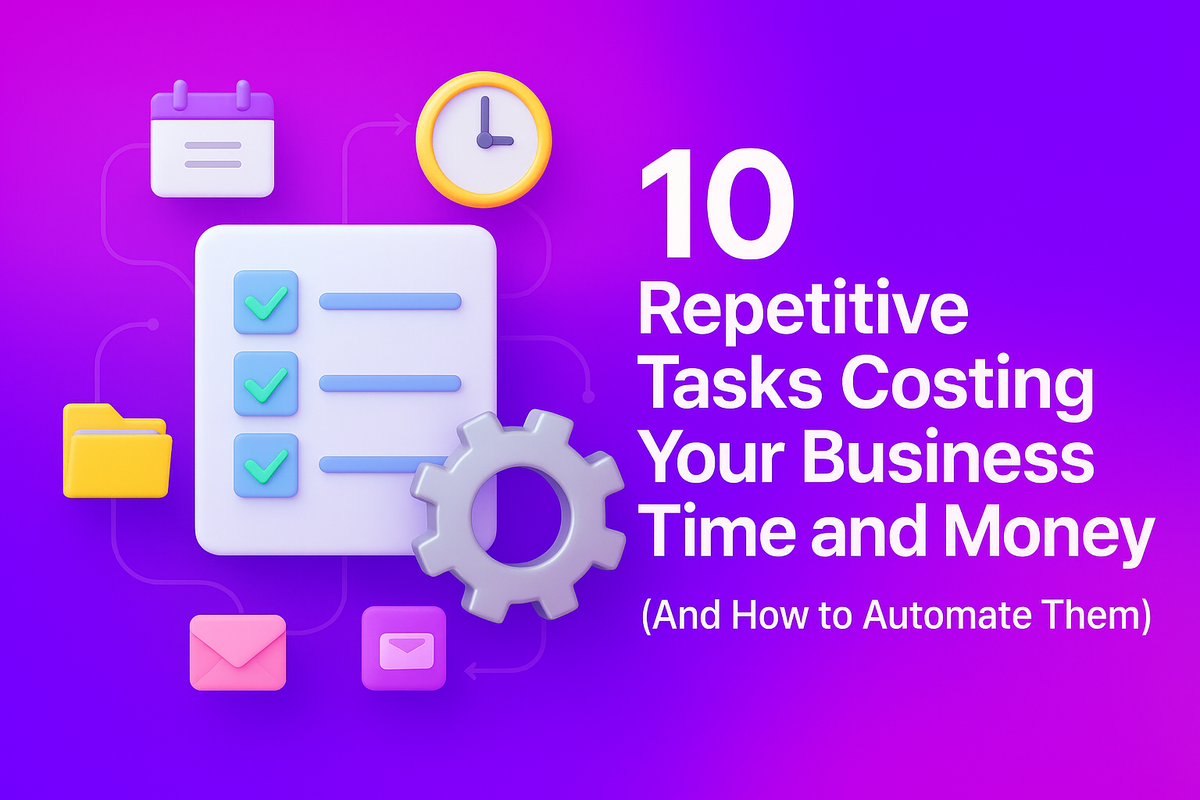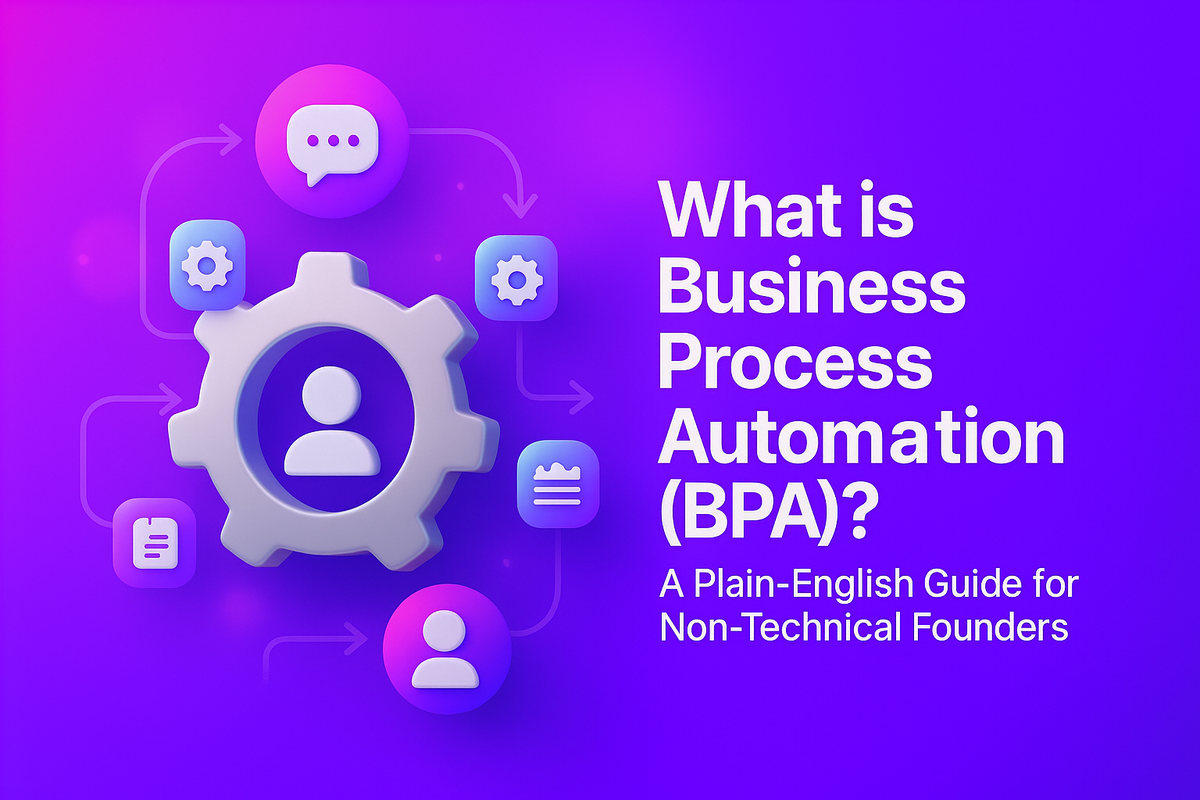
The Dutch market is buzzing with innovation, but it also presents unique challenges for Small and Medium-sized Enterprises (SMEs). Tight labour markets, rising operational costs, and the constant pressure to improve efficiency mean that standing still is not an option. Business automation has shifted from a luxury for large corporations to an essential survival tool for SMEs looking to grow and compete.
By automating repetitive tasks, you can free up your team for high-value work, reduce costly human errors, and create scalable processes that grow with your company.
⚠️ The Critical Challenge
But here lies the critical challenge: the success of your automation journey hinges almost entirely on the partner you choose. The right automation agency can be a powerful catalyst for growth, while the wrong one can lead to wasted time, budget overruns, and frustratingly ineffective solutions.
So, how do you navigate the landscape and find a true partner for your Dutch business? It starts with asking the right questions. This guide provides seven critical questions you must ask any potential automation agency to ensure they have the expertise, process, and vision to deliver real results for your SME.
Question 1: "What is your specific experience with SMEs in our industry, and what is your understanding of the Dutch market?"
Why It's Important
Automation is not a one-size-fits-all solution. An agency that has successfully automated processes for a large multinational bank may not understand the specific constraints and opportunities within a medium-sized logistics company in Rotterdam or a growing e-commerce business in Amsterdam. You need a partner who understands the nuances of your industry and the specifics of operating in the Netherlands—from compliance and data privacy (AVG/GDPR) to common software stacks (like Exact Online or AFAS) and local market pressures.
✅ What to Look For (Green Flags)
- Specific Case Studies: A great agency will be able to share case studies or examples of work they've done for businesses similar to yours in size and sector. They should be able to articulate the problem, the solution, and most importantly, the measurable results.
- Industry-Specific Language: They should speak your language. If you're in manufacturing, they should be able to discuss supply chain optimization and inventory management. If you're in professional services, they should understand lead nurturing, client onboarding, and automated invoicing.
- Local Market Knowledge: They should demonstrate an understanding of the Dutch business environment. This could manifest in their knowledge of local software integrations, labour laws that influence HR automation, or common challenges faced by Dutch SMEs.
🚩 What to Watch Out For (Red Flags)
- Vague Generalities: "We work with all kinds of businesses." While possibly true, this doesn't show specialized expertise. Press them for specifics relevant to you.
- Over-reliance on Global Examples: If all their case studies are from large US-based corporations, it's a sign they may not grasp the unique resource constraints and operational realities of a Dutch SME.
- Dismissiveness of Your Scale: An agency that primarily serves enterprises might see your project as small fry, potentially leading to less attention and a solution that is over-engineered and overpriced.
Question 2: "Can you walk me through your entire process, from our first conversation to post-implementation support?"
Why It's Important
A well-defined process is a hallmark of a professional and reliable agency. It shows they have a structured, repeatable methodology for delivering successful projects, rather than just "winging it." Understanding their process gives you clarity on what to expect, what your involvement will be, and how they ensure the final solution actually solves your problem.
✅ What to Look For (Green Flags)
A Phased Approach: Look for a clear, multi-step process that includes:
- Discovery & Audit: A deep dive into your current workflows. They should want to understand the 'why' behind your processes, not just the 'what'. This often involves process mapping and identifying specific bottlenecks and automation opportunities.
- Strategy & Solution Design: A phase where they present a clear plan, outlining which processes to automate, the recommended tools (e.g., RPA, Zapier, Make.com, custom API), the project timeline, and a detailed cost breakdown.
- Development & Implementation: The actual building and testing of the automations. They should have a clear methodology for testing to ensure everything works flawlessly before going live.
- Training & Handover: A plan to train your team on how to use and manage the new automated workflows.
- Support & Maintenance: A clear explanation of their ongoing support options.
Emphasis on Collaboration: A good partner will emphasize that this is a collaborative process. They will schedule regular check-ins and make you a part of the key decisions.
🚩 What to Watch Out For (Red Flags)
- A "Black Box" Approach: If they are vague about their process and essentially say, "Just tell us what you want, and we'll build it," be very cautious. This often leads to solutions that don't match the actual business need.
- Jumping Straight to Technology: If their first question is about which tool you want to use without first understanding your problem, they are a tool-seller, not a solution-provider.
- No Mention of Post-Launch Support: An automation project isn't "done" at launch. Software needs updates, APIs change, and your business processes will evolve. An agency that doesn't have a plan for this is setting you up for future failure.
Question 3: "Which automation platforms and technologies do you specialize in, and how do you decide on the right tools for a client?"
Why It's Important
The world of automation technology is vast, ranging from simple no-code platforms like Zapier and Make.com to complex Robotic Process Automation (RPA) tools like UiPath and sophisticated AI-driven solutions. You need an agency that is "tool-agnostic" rather than one that is a reseller for a single platform. A tool-agnostic agency will choose the technology that best fits your problem, budget, and scalability needs, not the one that pays them the highest commission.
✅ What to Look For (Green Flags)
- A Diverse Toolkit: A competent agency will have expertise across a range of platforms. They should be comfortable discussing the pros and cons of different approaches, such as when a simple Zapier workflow is sufficient versus when a more robust RPA bot is necessary.
- A Needs-Based Selection Process: Their answer should focus on you. "Our choice of tool depends entirely on the client's specific needs. For simple, linear tasks connecting cloud apps, we often start with Make.com. For complex data extraction from legacy systems, we might look at an RPA solution. It's all about finding the most efficient and cost-effective tool for the job."
- Scalability in Mind: They should explain how their chosen tools can scale. Can a simple workflow be expanded later? How do they ensure you don't get locked into a platform that you'll outgrow in a year?
🚩 What to Watch Out For (Red Flags)
- The "Golden Hammer": If they push one specific platform as the solution for every problem, they likely have a partnership or a limited skillset. This is like a carpenter who only owns a hammer and sees every problem as a nail.
- Lack of Justification: If they recommend a complex, expensive tool for a simple problem without a clear justification, they may be trying to maximize their project fee.
- Dismissal of Simpler Tools: Elitism towards simpler no-code tools can be a red flag. Sometimes, a 5-minute Zapier automation is genuinely the best and most cost-effective solution. An agency should embrace that.
Question 4: "How do you define and measure the success of an automation project? Can you give me an example of how you calculate ROI?"
Why It's Important
Automation is a business investment, and like any investment, it needs to generate a positive return. A technically perfect automation that doesn't save time, reduce costs, or increase revenue is a failure. You need an agency that thinks like a business partner and is obsessed with delivering measurable results.
✅ What to Look For (Green Flags)
Focus on Business Metrics: A great agency will immediately talk about Key Performance Indicators (KPIs). Success isn't just "the automation works"; it's:
- Hours Saved: "We saved the finance team 20 hours per week on invoice processing."
- Cost Reduction: "We reduced processing errors by 95%, saving €15,000 annually in rework costs."
- Increased Throughput: "We enabled the sales team to process 30% more leads per day."
- Improved Response Time: "We reduced customer support ticket first-response time from 4 hours to 15 minutes."
A Clear ROI Formula: They should be able to explain how they calculate the Return on Investment (ROI). A simple formula might be: (Financial Gain - Project Cost) / Project Cost. They should be able to help you quantify the "Financial Gain," even for metrics like "employee satisfaction" or "data accuracy."
Pre- and Post-Project Benchmarking: They should propose a method to measure the process before the automation is implemented to create a baseline. This is the only way to prove the impact afterwards.
🚩 What to Watch Out For (Red Flags)
- Focus on Technical Metrics Only: If they only talk about "bot uptime" or "successful API calls," they're missing the point. Those are technical health indicators, not business success metrics.
- Vague Promises: "It will make things more efficient." This is not a metric. Demand specifics. How much more efficient? How will we measure it?
- Inability to Discuss ROI: If they are uncomfortable talking about money and business impact, they are likely a team of technicians, not strategic consultants.
Question 5: "Who, specifically, from your team will be working on our project, and what are their qualifications?"
Why It's Important
You might be impressed by the senior partner in the sales meeting, but they are rarely the ones who will be building your automations. You need to know who will be in the trenches—the project manager, the developers, the solution architects. The success of your project rests on their skills, communication, and experience.
✅ What to Look For (Green Flags)
- Transparency: They should be happy to introduce you (even if just by profile/LinkedIn) to the core team members who would be assigned to your project.
- A Balanced Team: Look for a mix of skills. You don't just want a developer. A strong team often includes:
- A Project Manager: Your single point of contact who ensures the project stays on track and on budget.
- A Business Analyst / Solutions Architect: The person responsible for the initial discovery and for designing the solution to meet your business goals.
- An Automation Developer: The technical expert who actually builds and tests the workflows.
- Relevant Certifications and Experience: Ask about their experience with the specific tools they are proposing and if they hold any relevant certifications (e.g., from UiPath, Make.com, Microsoft Power Automate).
🚩 What to Watch Out For (Red Flags)
- Evasiveness: If they won't tell you who will work on your project, it could be a sign that they outsource their work to freelancers or a junior, inexperienced team.
- A "One-Man-Band": While some solo experts are brilliant, be cautious. What happens if they get sick, go on vacation, or are hit by a bus? A team provides redundancy and a broader skill set.
- Sales Team Disconnect: If the promises made by the salesperson seem disconnected from the technical team's understanding, it's a major warning sign of internal communication issues.
Question 6: "What does your long-term support and maintenance look like, and how do you ensure our automations can scale?"
Why It's Important
The digital world is dynamic. The software you use will update its API, a website you scrape will change its layout, or your own business processes will evolve. An automation that works perfectly today can break tomorrow. A reliable agency plans for this reality and provides clear options for ongoing support, ensuring your investment continues to deliver value long after the initial project is complete. Furthermore, they should build solutions that can grow with you.
✅ What to Look For (Green Flags)
- Structured Support Tiers: They should offer clear Service Level Agreements (SLAs). For example, different packages (e.g., Basic, Business, Enterprise) that guarantee response times and include a certain number of support hours per month.
- Proactive Monitoring: The best agencies don't just wait for you to tell them something is broken. They use monitoring tools to proactively check the health of your automations and often fix issues before you even notice them.
- A Scalable Architecture: When discussing the solution design, they should talk about scalability. This means using modular components, building for future growth, and avoiding hard-coded elements that are difficult to change later. They should be building a foundation, not just a single-room shed.
🚩 What to Watch Out For (Red Flags)
- "It just works": Any agency that implies their automations will never need maintenance is either inexperienced or dishonest.
- No Formal Support Plan: If their support plan is "just email us if something breaks," you're likely to be left in the lurch when an urgent issue arises.
- Short-Sighted Solutions: If their proposed solution solves today's problem but will need to be completely rebuilt to handle double the volume next year, they are not a strategic partner.
Question 7: "Can you provide a detailed breakdown of your pricing structure? What are the potential ongoing costs?"
Why It's Important
Transparency in pricing is non-negotiable. You need to understand exactly what you are paying for to accurately calculate your ROI and avoid any nasty surprises down the line. This includes the initial project cost as well as any recurring fees.
✅ What to Look For (Green Flags)
- Itemized Proposals: A professional proposal will break down the cost by phase (e.g., Discovery, Development, Support) and potentially by individual automation.
- Clarity on Pricing Models: They should clearly explain how they charge. Is it a fixed project fee, a time-and-materials basis (hourly rate), or a monthly retainer? Each has its pros and cons, and they should be able to explain why they recommend a particular model for your project.
- Full Disclosure of All Costs: This includes:
- The agency's fees.
- Software licensing costs for any automation platforms (e.g., the monthly fee for your Make.com or UiPath plan).
- Any potential API usage fees from other software.
- The cost of their ongoing support and maintenance plans.
🚩 What to Watch Out For (Red Flags)
- A Single, Opaque Number: If a proposal just contains one final price with no breakdown, ask for more detail. If they refuse, walk away.
- Hidden Costs: Be wary of agencies that don't proactively mention software licensing or ongoing support fees. These can significantly impact the total cost of ownership.
- Unrealistically Low Prices: If a price seems too good to be true, it probably is. This could indicate an inexperienced team, a misunderstanding of the project scope, or a plan to make up the difference with expensive "add-ons" later.
Conclusion: Choosing a Partner, Not Just a Provider
Choosing an automation agency is one of the most important business decisions you'll make. This is not about hiring a simple service provider; it's about finding a strategic partner who will become an integral part of your growth.
🎯 Your Path Forward
By asking these seven questions, you move beyond the glossy sales pitches and get to the heart of what an agency can truly deliver. You empower yourself to find a partner who is transparent, experienced, and genuinely invested in the success of your Dutch SME. The right agency will not only build automations for you; they will build a more efficient, resilient, and scalable future for your business.
Ready to start your automation journey with a partner who welcomes these questions? Contact us for a no-obligation discovery call, and let's explore how we can unlock your business's true potential.

